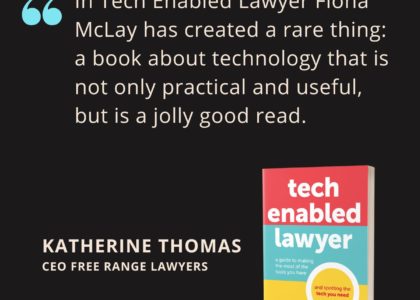
“Stay away from the office” is not a remote work strategy, but COVID-19 has made it a business continuity issue for office-based law firms, according to Katherine Thomas of Free Range Lawyers and Emma Heuston of The Remote Expert.
“Long-term remote working at scale requires a considered strategy and it isn’t simply a case of 'take your laptop home and get going', but that doesn’t mean that firms can’t address a few core issues quickly, to implement remote working at speed, if needed.”
Katherine Thomas, Free Range Lawyers Emma Heuston, The Remote Expert
“Stay away from the office” is not a remote work strategy, but COVID-19 has made it a business continuity issue for office-based law firms, according to Katherine Thomas of Free Range Lawyers and Emma Heuston of The Remote Expert.
In response to the spread of COVID-19, last week the World Health Organisation advised workplaces to “promote regular teleworking across your organization” and that “teleworking will help your business keep operating while your employees stay safe”. “In this context,” says Thomas, “remote working in law firms has moved from being a business model issue, to also being a business continuity issue.” Says Heuston, “it is a case of, ‘like it or not, it is time to get ready and hopefully learn something to implement in the long-term during the process’.”
“I’ve had a number of enquiries in the last week or so from law firms wanting to understand how to implement remote working quickly” says Katherine Thomas of Free Range Lawyers, a business that places remote working freelance lawyers with law firms and advises law firms on their remote working strategy “and they’re telling me that it is now an important part of their business continuity planning”.
Heuston agrees saying “there has been an upsurge in the purchases of my book ‘The Tracksuit Economy – how to work productively and effectively from home’ for people who want to make sure they are working from home in a productive way. But it is not as simple as reading my book. While that will help, there are a whole host of issues that need to be considered and applied to each unique workplace and team to make sure it is business as usual if remote work is required”.
Law firms well-placed for remote work
Law firms are better placed than many other organisations to continue operating during these exceptional times, says Heuston. “We’re in the knowledge business and with the technology available today, that means we can work anywhere and retain, even increase, productivity. Moreover, most law firms have their employees set up to work sporadically from home or away from the office already”. Thomas agrees, saying “long-term remote working at scale requires a considered strategy and it isn’t simply a case of 'take your laptop home and get going', but that doesn’t mean that firms can’t address a few core issues quickly, to implement remote working at speed, if needed.”
Core remote working issues
Thomas and Heuston advise that firms concentrate on a few core areas:
- Contracts, policies and procedures: Ensure that you have a policy that explicitly addresses remote working and specifies that COVID-19 arrangements are temporary. “You don’t want a case where employees expect that working wholly remotely is permanent if that is not what you intend after COVID-19 has passed,” says Heuston. “The expectations around a remote workspace, cyber security and availability must also be specified in a remote working policy,” adds Heuston. Finally, there needs to be a clear specification in an employee’s contract about the expectations surrounding remote work and the ability of the employer to define how the employee works once COVID-19 has passed, whether that is in-office, remotely, or a combination of the two. This can be achieved via a variation of employment contract.
Heuston suggests that, “these arrangements only need to be temporary, but if they are implemented with a mindset of curiosity rather than in panic mode, they could be very valuable to organisations long term as they see what does and doesn’t work for them and their teams when working remotely.”
- Technology: Alongside ensuring that staff have the technology available to work remotely and securely, it’s also important to ensure that people have access to clear, simple guidelines for how to use it. Video tends to work best: according to a study by the Pew Research Center, 87% of users said that YouTube is important for helping them figure out how to do things they haven’t done before. Short instructional videos can be created quickly using Loom, Pixiclip or Camtasia, for example.
- Behaviours: Give your people guidelines on how to work together across locations. “Communication is the key” says Thomas. “Our Free Range Lawyers are really experienced at remote working and they tell me every time that frequent and open communication is what makes the difference. In an office, we can get away with a lot of implicit communication, but remotely, we need more intentionality: we need to be more explicit about what we need, what we’re doing and how we feel. Leaders and managers play an important role in setting the tone.”
- Structure: Heuston, who spent four years working remotely for a Sydney based firm from her Northern Rivers home prior to starting the Remote Expert, maintains that structure is important during any period of remote work. “It can be useful for employees to follow their usual routine and have the same start and finish times and otherwise keep the day the same,” says Heuston. “The same applies for those leading teams” says Thomas. “Structure is core, from video-conference catch-ups at the start of each day to get the team connected and on-track, to weekly Friday “water-cooler” chats to give everyone a chance to unwind and socialise. The key for leaders is to be consistent because the intangible nature of remote working makes these meetings more important than ever.”
- Culture: Successful remote-working companies like HIVE Legal, Zapier or Basecamp work on their culture daily, just as co-located companies do. “It’s down to leaders to set the tone” says Thomas, “from punctuality in video-calls, to the team’s operating rhythm, to how the team socializes and bonds. Shared stories and phrases can be powerful. For example, early on in Free Range Lawyers’ life, we coined a simple phrase: ‘YIFAF” – ‘yours in freedom and flexibility’ – which we use to sign off our communications to one another. This small, simple act provides a shared experience and binds us together as a team every day.”
Despite the unwelcome reason for this upturn in remote working, both Thomas and Heuston believe that firms will benefit from what they learn as a result of the experience, saying “living through change is the best teacher of all. It will be interesting to see what emerges from firms incorporating remote working into the way they do business and the lessons learned once COVID-19 has passed.”
Katherine Thomas is CEO of Free Range Lawyers
Emma Heuston is Founder and Principal Lawyer at The Remote Expert.
Katherine’s eBook: Remote Working Success for Law Firms provides guidelines for lawyers, leaders of teams and business managers on how to implement a remote working strategy.
Emma’s book ‘The Tracksuit Economy – how to work productively and effectively from home’ is a guide to finding a work-life balance that works for you and includes a wealth of information about effective remote working.
www.freerangelawyers.com www.theremoteexpert.com



